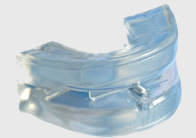Alternative Treatments
|
CPAP is the primary and the most effective treatment choice for patients with obstructive sleep apnea. Other treatments include a change in lifestyle, oral appliances, and upper airway surgery. |
|

|
Change in lifestyle With weight loss, avoiding alcohol, sedatives and smoking, and sleep position training to sleep on one's side, some people with mild sleep apnea can be treated. These simple solutions may no longer be effective as one gets older or if one gains weight. With exercise, small changes can make a difference. For users of CPAP, a referral for further sleep testing is needed after a weight loss or gain of more than 30 pounds. |
|
Oral appliances Appropriate for patients with mild sleep apnea with minimal daytime symptoms, oral appliances are also appropriate for patients who are unable to tolerate CPAP. A patient wears the appliance at night to hold the tongue and jaw in a forward position. Oral appliances should be fitted by qualified dental practitioners. The use of oral appliances should be monitored clinically following initiation of therapy to allow appliance adjustment and assessment of symptoms and side effects. Patients should undergo follow-up sleep monitoring with the oral appliance, and should be seen in follow-up by a qualified dental practitioner regularly to monitor treatment adherence, appliance deterioration and oral health. |

|

|
Upper airway surgery If CPAP therapy has been ruled out as an option, surgery in the upper airway may decrease obstructive sleep apnea events. An otolaryngologist (ear, nose and throat specialist) has the ability to examine your nose, mouth and throat to pinpoint where any obstruction is occurring in your airway. Tonsillectomy and uvulopalatopharyngoplasty may be considered in selected patients with obstructive sleep apnea. |
What if I choose to do nothing about my sleep apnea? Sleep apnea is not just an annoying habit. It is a serious, possibly life-threatening condition. Risks linked to untreated sleep apnea: |
|
Obstructive Sleep Apnea
Most Effective Treatment
Alternative Treatment
Additional Resources
Video
Website
Article


